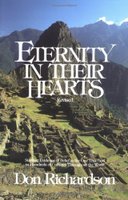 The concept and main idea of this book is worth reading about -- but the writing isn't so much. Richardson includes many stories from all over the world about people groups who were prepared to receive the Gospel long ago. That in some specific way, truth found in the Bible was written into the innerworkings of their beliefs and traditions. Many people groups (these particular examples came largely from Ssia) had lost 'The Book' and were waiting for an 'older brother' or 'white man' to come and restore this book and more instructions to them. Another common belief includes a supreme God -- who for some reason had been angered by their people and left them alone. For those who believe this, they often sacrificed to other spirits to keep them from being angry - instead of blind worship. This idea -- that humans are made to worship and know God is exciting and true. Not just as individuals, but as cultures and societies God's truth is written in our very being.
The concept and main idea of this book is worth reading about -- but the writing isn't so much. Richardson includes many stories from all over the world about people groups who were prepared to receive the Gospel long ago. That in some specific way, truth found in the Bible was written into the innerworkings of their beliefs and traditions. Many people groups (these particular examples came largely from Ssia) had lost 'The Book' and were waiting for an 'older brother' or 'white man' to come and restore this book and more instructions to them. Another common belief includes a supreme God -- who for some reason had been angered by their people and left them alone. For those who believe this, they often sacrificed to other spirits to keep them from being angry - instead of blind worship. This idea -- that humans are made to worship and know God is exciting and true. Not just as individuals, but as cultures and societies God's truth is written in our very being.
One chapter was devoted to other strange practices, telling a few stories of people groups who were prepared in other ways. These stories (and some others) made the book well worth reading. One fairly well known example is that of the Chinese writing system, which uses characters. Some words are portrayed visibly (drawn or written) as combinations of others. For example, the word righteousness is formed by writing the character for 'lamb' over the character for 'I' -- which shows the truth that to be declared righteous by God, we must be under the Lamb of God. In a very different vein of preparation, a couple cultures created cities of refuge, where murder and violence were not allowed (strangely parallel to God's instructions in Numbers to the Israelites). Lastly, Native Americans are often raised to understand and remember things in fours. They often pay attention better when there are four points to a lesson and resonate with places throughout the Bible where four is a valuable number. Hebrews also enjoyed numbers and found them very symbolic, so pieces of the Bible and God's truth easily make sense culturally to Native Americans. It's good to be reminded that God is all places long before we were, that He is the one who prepares hearts, minds, societies, cultures.
But -- I don't plan to read this book again. Richardson's tone was very discouraging to me. Some individuals have a way of speaking (and/or writing) which conveys their opinion is the only right opinion. Which also conveys that anyone who disagrees is wrong (and also stupid..). Richardson also goes back to look at Christ and the apostles in the Gospels and Acts, and creates lots of fiction. He gives emotions and reasons to various characters -- which could be true, but are not actually found in the narratives. Unless the Bible specifically states an individual's reason for a certain action -- we cannot know and should not assume. At least not to prove a point as if it were Biblical. Humility is a vital characteristic of a Christ follower, and sadly, Richardson does little to evidence that he has chosen to live humbly.
| Title: | Eternity in their Hearts |
|---|---|
| Author: | Don Richardson |
| Date published: | 1981 |
| Genre: | Religious |
| Series: | |
| Number of pages: | 213 |
| Notes: |


0 comments:
Post a Comment